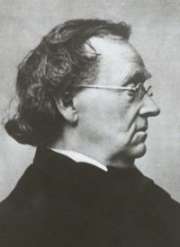|
Biographie Eduard Mörike
Eduard Friedrich Mörike (Ludwigsburg, 8 September 1804 – 4 June 1875 in Stuttgart) was a German romantic poet.
He studied Theology at the Seminary of Tübingen, and followed the ecclesiastical career, becoming a Lutheran pastor. In 1834 he was appointed pastor of Cleversulzbach near Weinsberg, and, after his early retirement for reasons of health, in 1851 became professor of German literature at the Katharinenstift in Stuttgart. This office he held until his retirement in 1866; but he continued to live at Stuttgart until his death on the 4th of June 1875.
Mörike is a member of the so-called Swabian school which gathered round Ludwig Uhland. His poems, Gedichte (1838; 22nd ed., 1905), are mostly lyrics, often humorous, but expressed in simple and natural language. His lieder (songs) are traditional in form and have been compared to those of Goethe. He also wrote a somewhat fantastic Idylle vom Bodensee, oder Fischer Martin und die Glockendiebe (1846; 2nd ed., 1856), and published a collection of hymns, odes, elegies and idylls of the Greeks and Romans, entitled Klassische Blumenlese (1840), and several novels and narratives, among the former Maler Nolten ("The painter Nolten", 1832; 6th ed., 1901), a bildungsroman which enjoyed great popularity. Another work is the novella Mozart auf der Reise nach Prag ("Mozart on the way to Prague", 1856), a humorous examination of the problems of artists in a world uncongenial to art. Many of his lyrics were set to music by Hugo Wolf. Mörike's Gesammelte Schriften (Collected Writings) were first published in 4 volumes.
|




